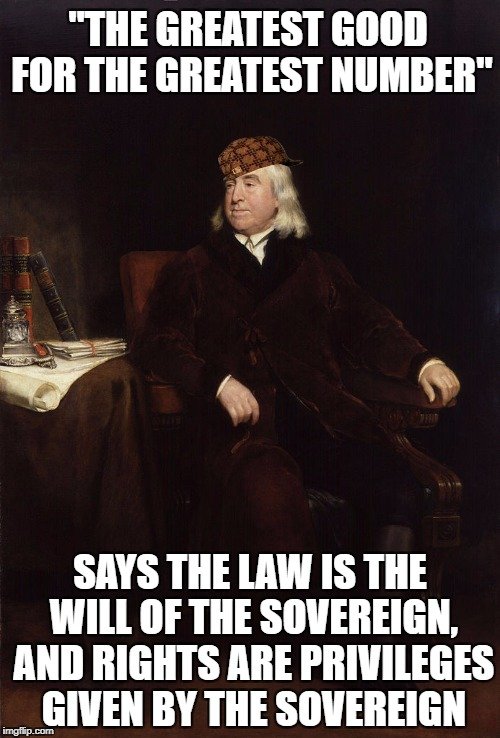One of my favorite classes in law school has been my Foundations in Law course.
One part ethics, one part history, and one part philosophy, this course has been, far and away, my favorite course because of its depth. In my other classes, I'm learning the mechanics of law. Torts is all about what torts the law recognizes, how to identify them, and how to apply fact patterns to the rules. Civil Procedure is the rules of court; how to bring cases and motions before trial, how to run through discovery, and how to identify when a court will dismiss or judge a case based on your actions as a lawyer. Criminal law is the same way. Legal writing is learning the nuts and bolts.
Foundations, on the other hand, is a class that attempts to build a foundation (no pun intended) in the understanding of what law is. It's not an easy question to answer, and the course started as far back as the Code of Hammurabi. It's been a constant progression of refining ideas as new modes of thinking entered the human consciousness. The concept of legal rights, of sovereign authority, of how law is made are all discussed. We've spent time discussing what good and bad are, and how they relate to the conception of law, both common law and statutory law.
So it's in that vein of exploratory thought that we've covered Jeremy Bentham. Having learned about his conception of law, and how it came to dominate legal thinking in the 19th and 20th centuries, I have only this to say...
Fuck Jeremy Bentham. With a cactus.

In fairness to Bentham, if it wasn't for Hobbes scribbling about how all humans beings are evil and how human life is "brutish and short" absent organized society, he might not have been such a douchecanoe. However, things being as they are, Jeremy Bentham is a dick to history.
First and foremost, his conception of morality as hedonism. This is the guy who birthed that loathsome notion that morality can be reduced to an equation; he birthed the horrific grotesquerie that is utilitarianism. He rejected previous notions of right and wrong as some sort of innate sense that one can reason out from first principles. Instead, he delivered the (in)famous line of thinking that right is simply whatever achieves the greatest pleasure for the greatest number. Good and bad are relative terms. Good is not something that is good because it's reasoned to be virtuous. Good is simply that which achieves the greatest pleasure or utility for the greatest number.
Second, and more unforgivable, his conception of law. This is where I've gone off the deep end for my loathing for this guy. Given that good and bad are measures of the amount of pleasure over the number of people, the law, Bentham argues, is not beholden to the principles of morality that were espoused by previous legal thinkers. Unlike Aquinas and Aristotle, who held that laws which did not serve the virtue of humankind were, in fact, not laws at all, Bentham argued that the law is whatever the guy who's in charge says it is.
Now, I want to be clear: law being the command of a sovereign is functionally true. The sovereign, be it a king or the legislature, does decide and promulgate the law. However, that says nothing as to whether a law is good or not. According to Bentham, a sovereign's will is the law. Period. Whatever the sovereign's will is, it is the law, and the law must be obeyed. Why? Because the sovereign has the power and you, its subject, do not. Because good and bad are now a matter of perspective, there is no overruling the will of the sovereign. There is no right to appeal to.
Which brings me to my second point about his conception of law. Rejecting the notion of natural law, he explicitly rejects the notion of natural rights. Simply put: you have none. Rights, to Bentham, are legal privileges that the sovereign allows you to have. That's it. Wanna know why that sounds familiar? How many times have you heard the phrase "the rights the Constitution gives us?" This asshole is where that thinking comes from.
I've gone on my rant long enough, so I'll just leave you with this parting thought: fuck Jeremy Bentham in the ear with a cactus. That is all.
If you want to vote for me as a witness, cast your vote here! Scroll down until you see this text box and type in my name.

Like what you read? Follow me, @anarcho-andrei! You can also find me on PALnet and the Fiction Workshop on Writer's Block:


Beep! Beep! This humvee will be patrolling by and assisting new veterans, retirees, and military members here on steemit. @shadow3scalpel will help by upvoting posts from a list of members maintained by @chairborne and responding to any questions replied to this comment.
Downvoting a post can decrease pending rewards and make it less visible. Common reasons:
Submit
I suspect the cactus should be shat upon by several vultures first.
This is where I think Gandhi might have received the enlightenment of Civil Disobedience. I loved how "55 saves lives" law/lie finally died because of it in my early driving life.
Downvoting a post can decrease pending rewards and make it less visible. Common reasons:
Submit